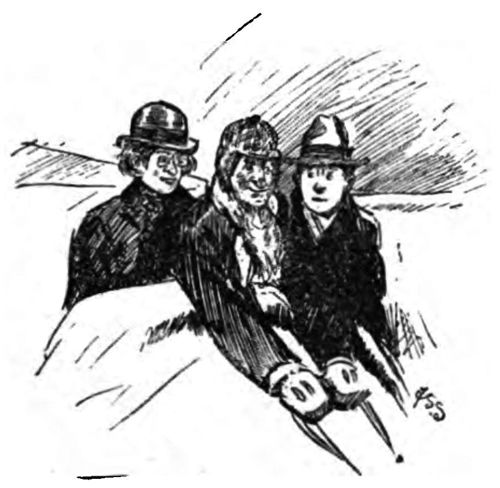
Charles Loomis
Illustration by Florence Scovel Shinn
Although Holmes doesn’t appear in this story, his theory of the science of deduction does. It is an early example of a Sherlock Holmes parody that featured neither Sherlock Holmes nor Dr. Watson. It appeared in the Feb. 20 issue of Puck, and was republished as “A La Sherlock Holmes” in The Four-masted Cat-boat and Other Truthful Tales (1895).

Jones and I recently had occasion to take a drive of four or five miles in upper Connecticut. We were met at the station by Farmer Phelps, who soon had us snugly wrapped in robes and speeding over the frozen highway in a sleigh. It was bitter cold weather—the thermometer reading 30 above zero. We had come up from Philadelphia, and to us such extreme cold was a novelty, which is all we could say for it.
As we rode along, Jones fell to talking about Conan Doyle’s detective stories, of which we were both great admirers—the more so as Doyle has declared Philadelphia to be the greatest American city. It turned out that Mr. Phelps was familiar with the “‘Meemoirs’ of Sherlock Holmes,” and he thought there was some “pretty slick reasonin’” in it. “My girl,” said he, “got the book out er the library an’ read it aout laoud to my woman an’ me. But of course this Doyle had it all cut an’ dried afore he writ it. He worked backwards an’ kivered up his tracks, an’ then started afresh, an’ it seems more wonderful to the reader than it reely is.”
“I don’t know,” said Jones; “I’ve done a little in the observation line since I began to read him, and it ‘s astonishing how much a man can learn from inanimate objects, if he uses his eyes and his brain to good purpose. I rarely make a mistake.”
Just then we drove past an outbuilding. The door of it was shut. In front of it, in a straight row and equidistant from each other, lay seven cakes of ice, thawed out of a water-pan.
“There,” said Jones; “what do we gather from those seven cakes of ice and that closed door?”
I gave it up.
Mr. Phelps said nothing.
Jones waited impressively a moment, and then said quite glibly: “The man who lives there keeps a flock of twelve hens—not Leghorns, but probably Plymouth Rocks or some Asiatic variety. He attends to them himself, and has good success with them, although this is the seventh day of extremely cold weather.”
I gazed at him in admiration.
Mr. Phelps said nothing.
“How do you make it all out, Jones?” said I.
“Well, those cakes of ice were evidently formed in a hens’ drinking-pan. They are solid. The water froze a little all day long, and froze solid in the night. It was thawed out in the morning and left lying there, and the pan was refilled. There are seven cakes of ice; therefore there has been a week of very cold weather. They are side by side: from this we gather that it was a methodical man who attended to them; evidently no hireling, but the good man himself. Methodical in little things, methodical in greater ones; and method spells success with hens. The thickness of the ice also proves that comparatively little water was drunk; consequently he keeps a small flock. Twelve is the model number among advanced poultrymen, and he is evidently one. Then, the clearness of the ice shows that the hens are not excitable Leghorns, but fowl of a more sluggish kind, although whether Plymouth Rocks or Brahmas or Langshans, I can’t say.
“Leghorns are so wild that they are apt to stampede through the water and roil it. The closed door shows he has the good sense to keep them shut up in cold weather.
“To sum up, then, this wide-awake poultryman has had wonderful success, in spite of a week of exceptionally cold weather, from his flock of a dozen hens of some large breed. How’s that, Mr. Phelps? Isn’t it almost equal to Doyle?”
“Yes; but not accordin’ to Hoyle, ez ye might say,” said he. “Your reasonin’ is good, but it ain’t quite borne aout by the fac’s. In the fust place, this is the fust reel cold day we’ve hed this winter. Secon’ly, they ain’t no boss to the place, fer she’s a woman. Thirdly, my haouse is the nex’ one to this, an’ my boy an’ hers hez be’n makin’ those ice-cakes fer fun in some old cream-pans. Don’t take long to freeze solid in this weather. An’, las’ly, it ain’t a hen-haouse, but an ice-haouse.”
The sun rode with unusual quietness through the heavens. We heard no song of bird. The winds were whist. All nature was silent.
So was Jones.